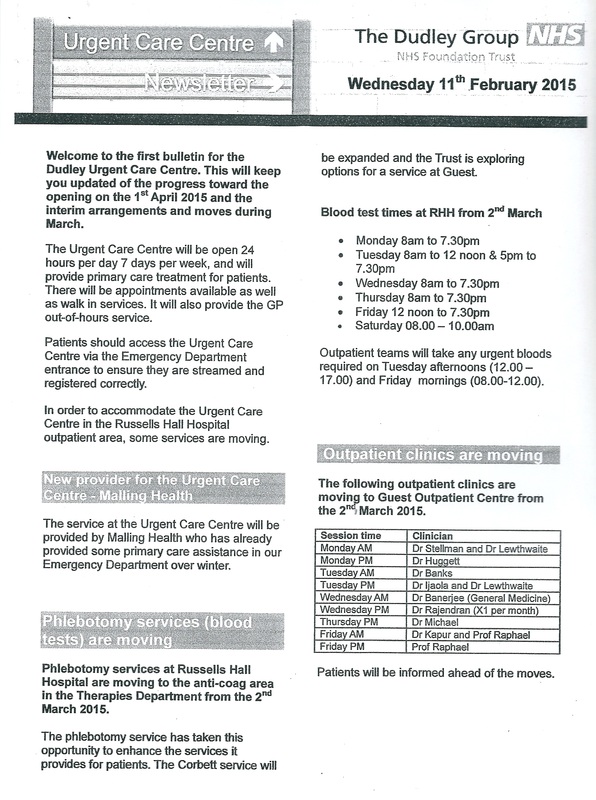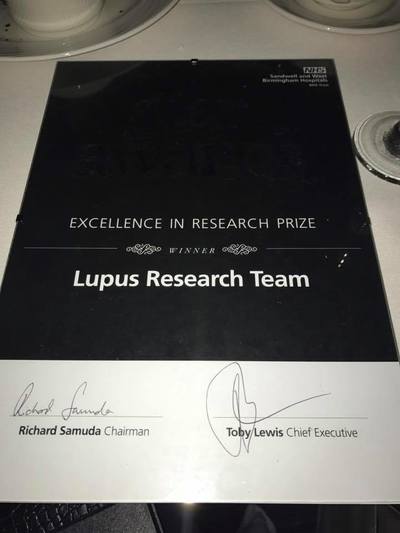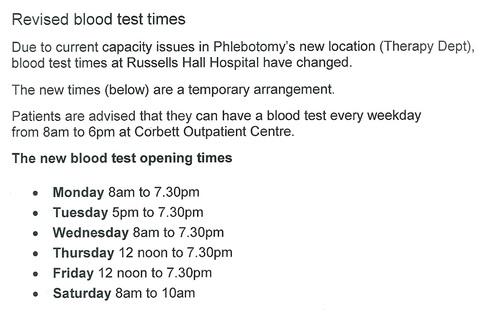2017
12th October
Congratulations to Prof Caroline Gordon and the Lupus Research Team on winning the Excellence in Research Award at the Sandwell and West Birmingham Hospitals Star Awards. Fantastic result!
6th October
PRESS RELEASE
Black Country consultant leads UK’s first Lupus guideline
The first UK guideline on how to treat the life-limiting condition Lupus will “measurably improve patient care”, according to its world renowned Birmingham author.
Professor Caroline Gordon, who is a consultant rheumatologist at Sandwell and West Birmingham Hospitals NHS Trust, is the lead author behind the new document, which has been published by the British Society of Rheumatology. The guideline covers the care of adults with systemic lupus erythematosus (lupus) - a chronic condition where the body's immune system attacks healthy organs and tissue. The condition can affect anyone at any age. US singer and actress Selena Gomez recently revealed she was diagnosed with Lupus and has undergone a kidney transplant as part of her treatment.
Lupus expert, Prof Gordon, who is based at City Hospital, in Birmingham, said: “As a result of this guideline I would expect that patients will experience measurable improvements in care. “With earlier diagnosis and more appropriate treatment we should see more rapid resolution of symptoms, reduction in disease flares and improvements in the quality of life of patients, with less long-term complications of the disease and its treatment and improved survival rates.” She added: “Lupus can affect any part of the body and can be difficult to diagnose and treat. It is more common than many people realise, has a major impact on the health and activities of individuals with the disease and it is associated with a significant risk of dying prematurely - reducing average lifespan by about 25 years. “This guideline is essential because it provides advice on how to diagnose the condition and then how to assess the disease and determine what type of treatment will be most suitable, whether people have common manifestations such as skin rashes and arthritis, or less common but potentially more serious problems such as kidney disease.”
The guideline is aimed at rheumatologists and clinical nurse specialists in lupus, as well as nephrologists, immunologists, dermatologists, emergency medicine practitioners and GPs.
The guideline provides advice on how people should be monitored for evidence of improvement or deterioration, encourages the use of a variety of treatments to ensure less reliance on steroids to control symptoms and provides information on which drugs to use for people that do not respond to initial treatment plans. Importantly, it also emphasises the need for people with the most serious and difficult to control forms of the disease to be referred to specialised lupus centres to access new therapies and multi-disciplinary teams. It guides the care of patients with common symptoms such as skin rashes and arthritis as well as those with less common but potentially more serious problems like kidney disease
Yvonne Norton, patient representative on the Guideline Working Group, also Vice-Chair of LUPUS UK and Chair of West Midlands Lupus Group, said “Since being diagnosed in 1975, I’ve spent what must amount to years in hospitals and I take a massive amount of medication. I can’t fault the doctors who’ve treated me but it would have been so much better and easier for them, and me, if there had been a Guideline to show the right path for them to take.”
Elizabeth MacPhie, Consultant Rheumatologist and Chair of the British Society for Rheumatology’s Standards, Audit and Guidelines Working Group, said: “Our guidelines are key to good care in rheumatological conditions. “They firmly link the evidence base to clinical practice to help health professionals deliver the right care at the right time to the right patients – which might sound simple but can be a real challenge in a relapsing and remitting condition such as lupus.”
The guidelines are accredited by the National Institute for Health and Care Excellence (NICE) which recognises robust, evidence-based and critically evaluated high-quality processes applied to developing a clinical guideline.
You can read and download the full guideline below:
GO TO GUIDELINE
Black Country consultant leads UK’s first Lupus guideline
The first UK guideline on how to treat the life-limiting condition Lupus will “measurably improve patient care”, according to its world renowned Birmingham author.
Professor Caroline Gordon, who is a consultant rheumatologist at Sandwell and West Birmingham Hospitals NHS Trust, is the lead author behind the new document, which has been published by the British Society of Rheumatology. The guideline covers the care of adults with systemic lupus erythematosus (lupus) - a chronic condition where the body's immune system attacks healthy organs and tissue. The condition can affect anyone at any age. US singer and actress Selena Gomez recently revealed she was diagnosed with Lupus and has undergone a kidney transplant as part of her treatment.
Lupus expert, Prof Gordon, who is based at City Hospital, in Birmingham, said: “As a result of this guideline I would expect that patients will experience measurable improvements in care. “With earlier diagnosis and more appropriate treatment we should see more rapid resolution of symptoms, reduction in disease flares and improvements in the quality of life of patients, with less long-term complications of the disease and its treatment and improved survival rates.” She added: “Lupus can affect any part of the body and can be difficult to diagnose and treat. It is more common than many people realise, has a major impact on the health and activities of individuals with the disease and it is associated with a significant risk of dying prematurely - reducing average lifespan by about 25 years. “This guideline is essential because it provides advice on how to diagnose the condition and then how to assess the disease and determine what type of treatment will be most suitable, whether people have common manifestations such as skin rashes and arthritis, or less common but potentially more serious problems such as kidney disease.”
The guideline is aimed at rheumatologists and clinical nurse specialists in lupus, as well as nephrologists, immunologists, dermatologists, emergency medicine practitioners and GPs.
The guideline provides advice on how people should be monitored for evidence of improvement or deterioration, encourages the use of a variety of treatments to ensure less reliance on steroids to control symptoms and provides information on which drugs to use for people that do not respond to initial treatment plans. Importantly, it also emphasises the need for people with the most serious and difficult to control forms of the disease to be referred to specialised lupus centres to access new therapies and multi-disciplinary teams. It guides the care of patients with common symptoms such as skin rashes and arthritis as well as those with less common but potentially more serious problems like kidney disease
Yvonne Norton, patient representative on the Guideline Working Group, also Vice-Chair of LUPUS UK and Chair of West Midlands Lupus Group, said “Since being diagnosed in 1975, I’ve spent what must amount to years in hospitals and I take a massive amount of medication. I can’t fault the doctors who’ve treated me but it would have been so much better and easier for them, and me, if there had been a Guideline to show the right path for them to take.”
Elizabeth MacPhie, Consultant Rheumatologist and Chair of the British Society for Rheumatology’s Standards, Audit and Guidelines Working Group, said: “Our guidelines are key to good care in rheumatological conditions. “They firmly link the evidence base to clinical practice to help health professionals deliver the right care at the right time to the right patients – which might sound simple but can be a real challenge in a relapsing and remitting condition such as lupus.”
The guidelines are accredited by the National Institute for Health and Care Excellence (NICE) which recognises robust, evidence-based and critically evaluated high-quality processes applied to developing a clinical guideline.
You can read and download the full guideline below:
GO TO GUIDELINE
2016
28th June
28th June

Former Mayor Councillor Steve Waltho hands
over cash to Dudley charities
The Mayor of Dudley has facilitated the handover of more than £55,000 to his predecessor’s charities.
Councillor Mohammed Hanif invited Councillor Steve Waltho back to the mayoral office, along with his chosen five charities to receive the record-breaking fundraising effort.
Representatives from The Hope Centre, The What? Centre, More Mascots Please, Leukaemia Unit Appeal Fund, Russells Hall and The West Midlands Lupus Group all received cheques of £10,400 with an additional £3,500 for the Lupus Group for granting places at the London Marathon.
Cllr Waltho, said: “My wife, Jayne, and I take great satisfaction that five wonderful charities are to substantially benefit from our mayoral year. These organisations will in turn benefit many disadvantaged or poorly people in our great borough.
“I would like to give huge thanks to our voluntary fundraiser, Sue Randle. Thank you to Sophie Byatt from Castle & Crystal Credit Union for managing our online donation account. I would also like to thank all of the mayoral support staff.
“Finally, a massive thanks to all the individuals, groups and organisations that generously contributed throughout the year to reach such a fantastic record total.”
Cllr Hanif added: “Being Mayor brings along so many opportunities to meet people from organisations across our borough and to help where we can.
“Congratulations to Steve and Jayne on their successful year and I hope that people will be as generous this year to help me support my three charities.”
over cash to Dudley charities
The Mayor of Dudley has facilitated the handover of more than £55,000 to his predecessor’s charities.
Councillor Mohammed Hanif invited Councillor Steve Waltho back to the mayoral office, along with his chosen five charities to receive the record-breaking fundraising effort.
Representatives from The Hope Centre, The What? Centre, More Mascots Please, Leukaemia Unit Appeal Fund, Russells Hall and The West Midlands Lupus Group all received cheques of £10,400 with an additional £3,500 for the Lupus Group for granting places at the London Marathon.
Cllr Waltho, said: “My wife, Jayne, and I take great satisfaction that five wonderful charities are to substantially benefit from our mayoral year. These organisations will in turn benefit many disadvantaged or poorly people in our great borough.
“I would like to give huge thanks to our voluntary fundraiser, Sue Randle. Thank you to Sophie Byatt from Castle & Crystal Credit Union for managing our online donation account. I would also like to thank all of the mayoral support staff.
“Finally, a massive thanks to all the individuals, groups and organisations that generously contributed throughout the year to reach such a fantastic record total.”
Cllr Hanif added: “Being Mayor brings along so many opportunities to meet people from organisations across our borough and to help where we can.
“Congratulations to Steve and Jayne on their successful year and I hope that people will be as generous this year to help me support my three charities.”

2015
21st May
During his inauguration as Mayor of Dudley, Cllr Steve Waltho (pictured with his Mayoress, Jayne) announced that WMLG will be one of his official charities for 2015/16.
21st May
During his inauguration as Mayor of Dudley, Cllr Steve Waltho (pictured with his Mayoress, Jayne) announced that WMLG will be one of his official charities for 2015/16.

2015
10th May
Wednesday 6th May and Thursday 7th May, the Lupus/ Rheumatology Team at City Hospital, B'ham, once again held Coffee Mornings during the Lupus Clinics to raise awareness of lupus and funds for WMLG
10th May
Wednesday 6th May and Thursday 7th May, the Lupus/ Rheumatology Team at City Hospital, B'ham, once again held Coffee Mornings during the Lupus Clinics to raise awareness of lupus and funds for WMLG
2015
4th March
Following on from the previous news item (15th February), changes to times for blood tests at Russells Hall Hospital, Dudley, have hit problems - lack of space within the Therapy Dept being the main issue. Here is the list of revised times:
4th March
Following on from the previous news item (15th February), changes to times for blood tests at Russells Hall Hospital, Dudley, have hit problems - lack of space within the Therapy Dept being the main issue. Here is the list of revised times:
__________________________________________________________________________

2015
15th February
1st April sees the opening of Dudley
Urgent Care Centre at Russells Hall Hospital with changes to blood testing
times/location beginning 2nd March.
The first Urgent Care Centre Newsletter
explains the changes.









